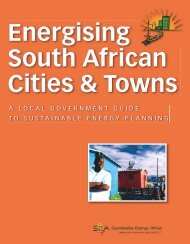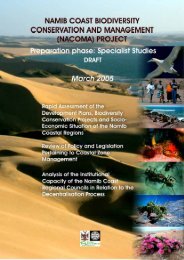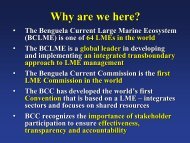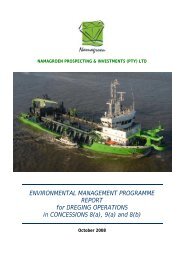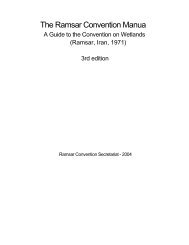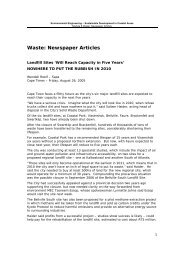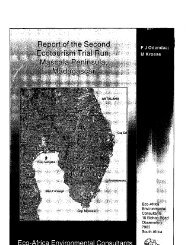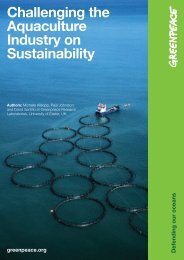Feasibility Study of Proposed Tourism Dev in Shewula, NE ...
Feasibility Study of Proposed Tourism Dev in Shewula, NE ...
Feasibility Study of Proposed Tourism Dev in Shewula, NE ...
You also want an ePaper? Increase the reach of your titles
YUMPU automatically turns print PDFs into web optimized ePapers that Google loves.
Chapter 4 - Socio-Cultural F<strong>in</strong>d<strong>in</strong>gs and Analysis<br />
4.9. ANALYSIS OF THE COMMUNITY'S RESPONSES<br />
4.9.1. An assessment <strong>of</strong> the general response trends<br />
Overall, the general reactions recorded were primarily concerned with <strong>in</strong>itiatives at<br />
the immediate local level, i.e. the reserve and tourism development, and less so with<br />
the Lubombo Conservancy. In general, these reactions appear to <strong>in</strong>dicate that the<br />
idea <strong>of</strong> establish<strong>in</strong>g a reserve is problematic but that there is a qualified acceptance<br />
<strong>of</strong> (and even some support for) the tourism development project. However, there is<br />
not a significant level <strong>of</strong> broad-based community commitment to either <strong>of</strong> these<br />
<strong>in</strong>itiatives.<br />
The positive reactions to the proposed tourism development could provide a<br />
foundation on which further support for the project can be built, although at the same<br />
time they could potentially result <strong>in</strong> high expectations, which may not be immediately<br />
met or which might be unrealistically high.<br />
Some <strong>of</strong> the negative reactions that have been documented by the study could also<br />
be advantageous to the project, s<strong>in</strong>ce they reflect real fears and doubts about the<br />
costs and benefits <strong>of</strong> the project to the community. These reactions are an <strong>in</strong>dication<br />
that the community is aware <strong>of</strong> or will understand some <strong>of</strong> the pitfalls and problems<br />
that have been encountered <strong>in</strong> other, similar, projects and which could very well be<br />
associated with their own tourism development project. This is useful, s<strong>in</strong>ce it allows<br />
for forward plann<strong>in</strong>g <strong>in</strong> which anticipated negative impacts can be planned for and<br />
mitigated aga<strong>in</strong>st, while at the same time the expectations <strong>of</strong> potential benefits to be<br />
derived from tourism development can be moderated and managed.<br />
However, there are also some negative reactions which could be problematic for<br />
the project. Some are based on misunderstand<strong>in</strong>gs or lack <strong>of</strong> <strong>in</strong>formation, and should<br />
therefore be relatively easy to overcome, provided that the necessary clarity and<br />
<strong>in</strong>formation is provided. Other negative reactions appear to be more deeply rooted,<br />
and will require functional conflict resolution and management mechanisms if they<br />
are hot to adversely affect the feasibility <strong>of</strong> the project. The sensitivity with which the<br />
community's concerns are addressed and the degree to which <strong>in</strong>tensely negative<br />
reactions can be tempered, will therefore <strong>in</strong>fluence the ultimate feasibility <strong>of</strong> the<br />
project.<br />
In some ways it is the mixed reactions that are the most problematic for establish<strong>in</strong>g<br />
a tourism development, such as that proposed for the <strong>Shewula</strong> area. These<br />
reactions, which appear to be predom<strong>in</strong>ant <strong>in</strong> the <strong>Shewula</strong> Community at present,<br />
result <strong>in</strong> the problem <strong>of</strong> <strong>in</strong>ertia that is a constra<strong>in</strong>t encountered <strong>in</strong> many spheres <strong>of</strong><br />
development. The ambivalence <strong>of</strong> these responses is understandable, s<strong>in</strong>ce the<br />
benefits that such developments promise are entic<strong>in</strong>g but they are accompanied by<br />
costs and a fear <strong>of</strong> the unknown which prevents people from tak<strong>in</strong>g action, or<br />
becom<strong>in</strong>g <strong>in</strong>volved <strong>in</strong> such a project. If the proposed development is to ga<strong>in</strong> the<br />
support <strong>of</strong> the people, then it must be demonstrated that the benefits <strong>of</strong> the project<br />
for the community will outweigh the costs that will be <strong>in</strong>curred by the community. This<br />
creates a situation <strong>in</strong> which the support necessary for the success <strong>of</strong> the project<br />
depends on the project demonstrat<strong>in</strong>g its success.<br />
This situation is far from ideal. There are, however, a number <strong>of</strong> ways <strong>in</strong> which this<br />
situation can be overcome. One <strong>of</strong> these is by encourag<strong>in</strong>g learn<strong>in</strong>g from<br />
experiences <strong>in</strong> other similar projects, which can demonstrate the possibilities <strong>of</strong><br />
89




